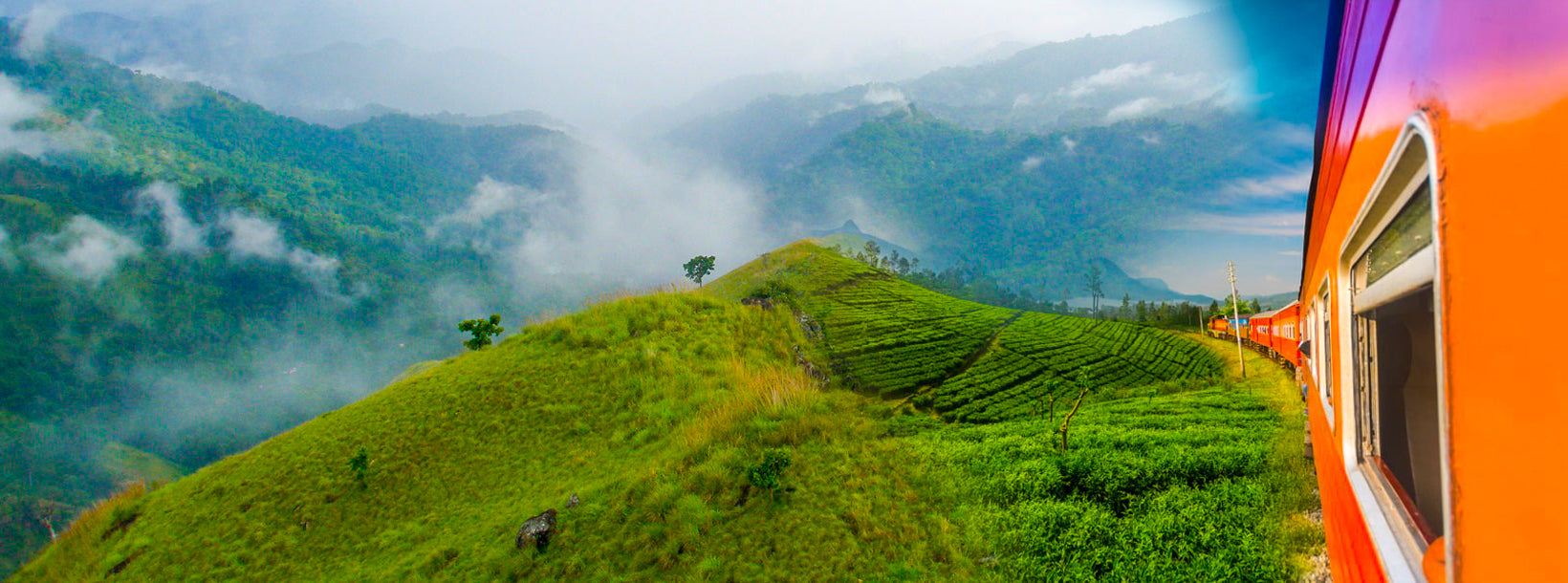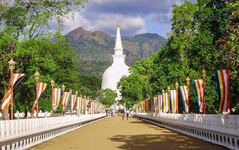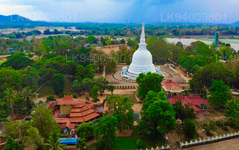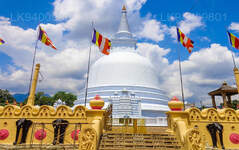
Badulla-Stadt
Badulla: Malerische Stadt im Bergland von Sri Lanka, umgeben von üppigen Teeplantagen und mit malerischen Landschaften, Wasserfällen und kulturellen Sehenswürdigkeiten.
Mahiyangana Viharaya
Mahiyangana Laut Mahavamsa war Sivuhelaya (Sri Lanka) von Sivu-Helayos bevölkert. Die Yakkhas (Clans) lebten damals in Mahiyangana. Es heißt, Buddha habe mit ihnen über Dhamma diskutiert. Ein Yakkha-Häuptling namens Saman (der heute als Gottheit gilt) erlangte Sotapanna (erste Stufe der Befreiung), nachdem er Buddhas Rede angehört hatte, und bat Buddha um ein Zeichen, das sie in seiner Abwesenheit anbeten könnten. Buddha gab ihm eine Handvoll Haarreliquien von seinem Kopf, die Saman später in einem kleinen, 3 m hohen Stupa beisetzte. Dies war der erste Stupa, der zu Lebzeiten Buddhas in Sri Lanka errichtet wurde. Nach Buddhas Parinirvana brachte ein Arhant namens Sarabhu das linke Schulterbein des Buddha, das man vom Scheiterhaufen geborgen hatte. Auch diese Reliquie wurde in einen Schrein eingeweiht und die Stupa auf eine Höhe von 5,5 m vergrößert. Seitdem haben mehrere Könige die Stupa renoviert und vergrößert. König Dutugamunu erhöhte sie auf eine Höhe von 36 m. Herrscher wie Voharikatissa, Sena II., Vijayabahu I. und Kirthi Sri Rajasinghe haben den Tempel instand gehalten. 1942 wurde unter dem ehrenwerten DS Senanayake, dem ersten Premierminister Sri Lankas, eine Gesellschaft zur Renovierung des Tempels gegründet. Die Wiederaufbauarbeiten begannen 1953 und endeten 1980 mit der Fertigstellung einer neuen Spitze für die Stupa.
Besondere Orte in Badulla
-
 Muthiyangana Raja Maha Vihara
Muthiyangana Raja Maha ViharaDer Muthiyanganaya Raja Maha Viharaya liegt im Zentrum der Stadt Badulla. Die Geschichte dieses Tempels reicht bis in die Zeit Buddhas zurück, doch die Gegend um Badulla hat ihre Wurzeln im 19. und 18. Jahrhundert v. Chr.
-
 Dowa Raja Maha Viharaya
Dowa Raja Maha ViharayaDer Dowa Raja Maha Viharaya (Dowa-Kap-Tempel) liegt wenige Kilometer von der Stadt Bandarawela entfernt an der Straße Bandarawela – Badulla. Man nimmt an, dass dieser Tempel im 1. Jahrhundert v. Chr. von König Walagamba erbaut wurde.
-
 Bogoda-Holzbrücke
Bogoda-HolzbrückeDie Bogoda-Holzbrücke wurde im 16. Jahrhundert während der Dambadeniya-Ära erbaut. Sie gilt als die älteste erhaltene Holzbrücke Sri Lankas. Die Brücke befindet sich 7 Kilometer westlich von Badulla.
-
 Dunhinda-Wasserfälle
Dunhinda-WasserfälleDie Dunhinda-Wasserfälle liegen etwa 5 km von der Stadt Badulla entfernt. Sie sind 63 Meter hoch und gelten als einer der schönsten Wasserfälle Sri Lankas. Ihren Namen verdanken sie dem feinen, tauartigen Sprühnebel.
Über den Bezirk Badulla
Badulla ist die Hauptstadt der Provinz Uva in Sri Lanka. Die Stadt liegt südöstlich von Kandy, fast vollständig vom Fluss Badulu Oya umschlossen, etwa 680 Meter über dem Meeresspiegel, und ist von Teeplantagen umgeben. Überragt wird sie vom Namunukula-Gebirge. Badulla liegt etwa 230 Kilometer von Colombo entfernt an den östlichen Ausläufern des zentralen Hochlands von Sri Lanka.
Badulla und Umgebung sind für Ökotouristen sehr zu empfehlen, da der Horton Plains Nationalpark und die Knuckles Mountains nur wenige Stunden entfernt liegen.
Über die Provinz Uva
Die Provinz Uva ist mit 1.187.335 Einwohnern die zweitbevölkerungsärmste Provinz Sri Lankas und wurde 1896 gegründet. Sie besteht aus den beiden Distrikten Badulla und Moneragala. Die Provinzhauptstadt ist Badulla. Uva grenzt an die Ost-, Süd- und Zentralprovinz. Zu den wichtigsten Touristenattraktionen zählen die Dunhinda-, Diyaluma- und Rawana-Wasserfälle, der Yala-Nationalpark (der sich teilweise in der Süd- und Ostprovinz erstreckt) und der Gal-Oya-Nationalpark (der sich teilweise in der Ostprovinz befindet). Die Gal-Oya-Hügel und das Zentralgebirge bilden das wichtigste Hochland, während die Flüsse Mahaweli und Menik sowie die riesigen Stauseen Senanayake Samudraya und Maduru Oya die wichtigsten Wasserwege in der Provinz Uva darstellen.
















